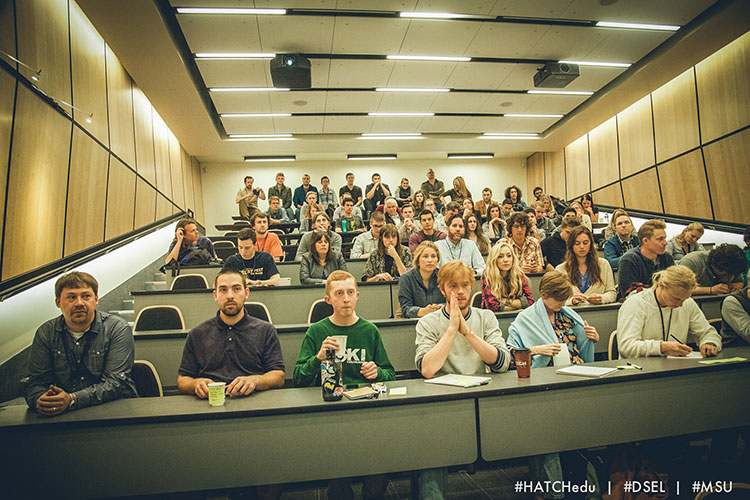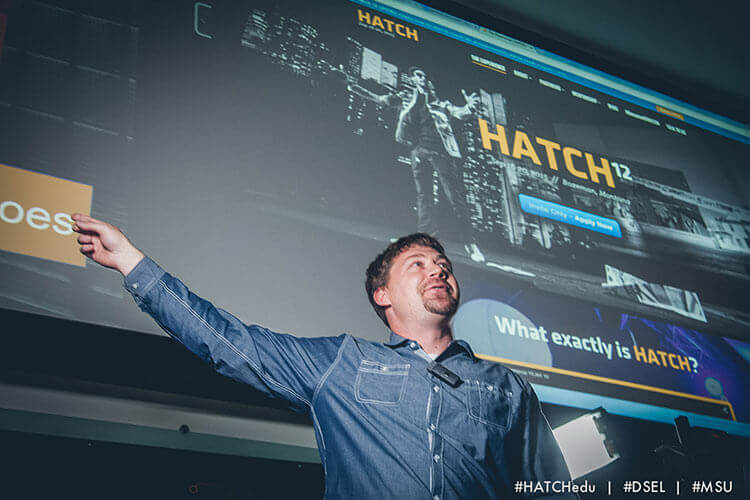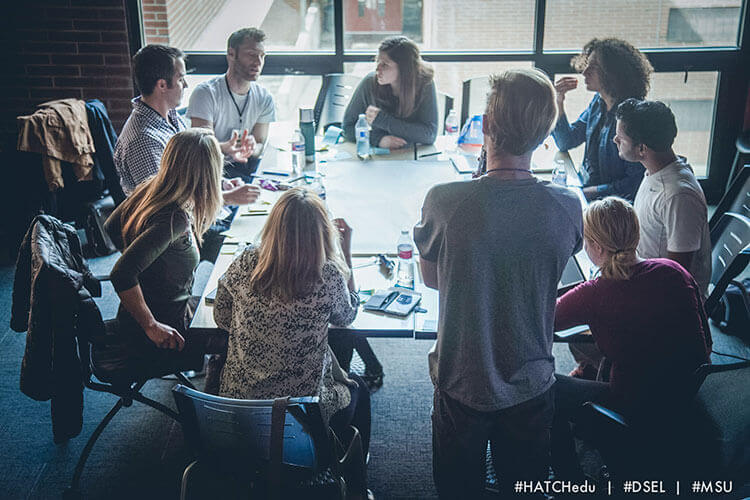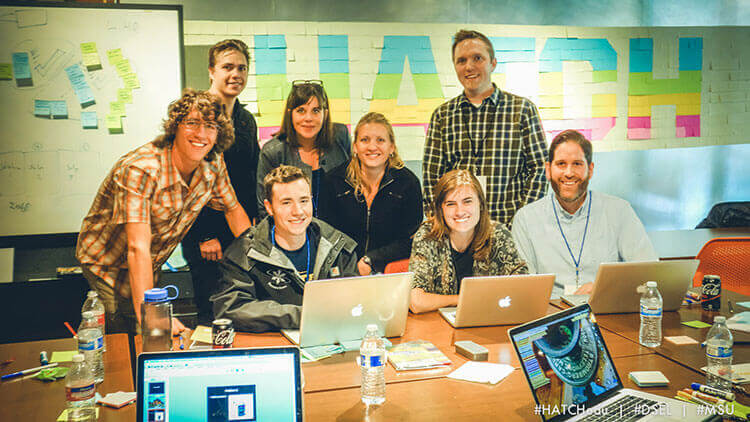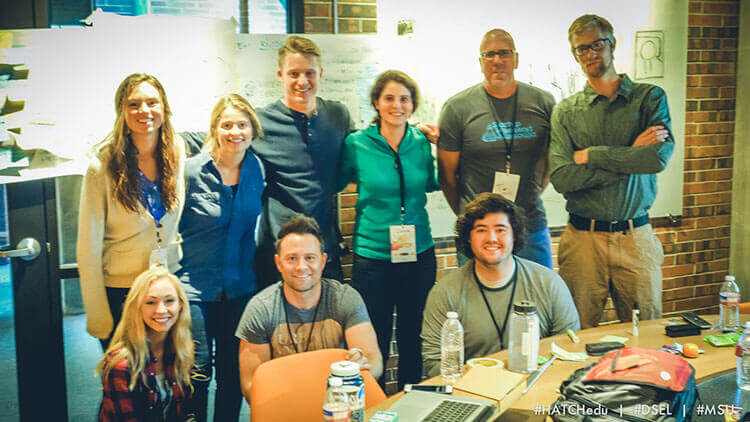HATCH + MSU
 Founded in 2004, by a Montana State University Alumni, HATCH is a non-profit ecosystem that consists of two annual Summits (Montana & HATCH Europe), year-round mentorship programs, and a global network that connects to accelerate solutions for positive impact.
Founded in 2004, by a Montana State University Alumni, HATCH is a non-profit ecosystem that consists of two annual Summits (Montana & HATCH Europe), year-round mentorship programs, and a global network that connects to accelerate solutions for positive impact.
HATCH & MSU has worked together and collaborated for fifteen years, since HATCH’s inception in 2004. Since then, HATCH has implemented dozens of workshops, panels, brought multiple speakers to campus and continues to look for opportunities to co-create on innovative programming, collaborate on mentorship opportunities for current students, engage professors, and support Alumni. Over 500 MSU students have been through HATCH and dozens of MSU faculty and admin have participated in the experience. Read MSU Student Testimonials here.
There have been nearly twenty products launched #becauseofHATCH that have been distributed, won awards, and received recognition of excellence. One of those products was on the front page of the NY Times, and another was from MSU Alumni David Yakos, whose product was recognized with Toy of the Year and is geared toward helping young minds develop problem solving skills, and an engineering mindset.
In collaboration with MSU, HATCH has also orchestrated two on-campus “HATCH Lab” rapid sprint design thinking workshops with MSU professors and students. These workshops yielded two dozen real world projects, some of which were brought to life and continue to operate today.
MSU’s very own cross-disciplinary program DSEL was inspired in part by HATCH, and Launch Cats was created by a MSU student Sam Lucas after his HATCH experience.
HATCH Edu Lab CHALLENGE & PROJECTS CRITERIA:
Apply design thinking to develop a solution for a real, definable issue, and offer useful tools to someone dedicated to solving that issue. This lab must be a project, that when momentum is created, can be handed off to a HATCH network or MSU “owner” and benefit a living, ongoing initiative. The lab’s outcomes will should be able to be integrated into Spring semester of the design thinking curriculum of DSEL – so it’s key to harness the resources effectively and make a tangible, trackable impact.
WHAT TOOK PLACE:
HATCHedu 2017 took place over the course of 53 hours from January 20th to the 22nd at Jake Jabs Hall on the Montana State University campus. Every single hour was intensely focused on prototyping real-world solutions for some of the most pressing challenges facing campus, our communities, and our world.
The HATCH facilitation team was led by social impact entrepreneur Mark Brand, culture creator and restauranteur Pete Strom, and HATCH Founder, Yarrow Kraner. Coaches/mentors included renowned cellist, composer and Inventor Philip Sheppard, Mamalode Founder and publisher Elke Govertsen, concepts designer and Eqogo Founder Mark Goerner, Global Head of Development for Sid Lee San Rahi, and serial entrepreneur/executive Brandt Williams.
For the vast majority of MSU participants, HATCHedu was the first of any exposure to HATCH programming or our global network of mentors. The participants included over 90 students and faculty from the Colleges of Arts & Architecture, Business, Engineering, and from the Blackstone Launchpad program. Student majors ranged from Architecture to Environmental Sciences and from Mechanical Engineering to Business Management and pretty much everything in between.
HERE’S WHY THAT ALL MATTERS:
PERSPECTIVES WERE CHANGED. AND MOTIVATION WAS CREATED.
“HATCHedu was not at all what I expected. I had no idea how self-motivated and capable the HATCHers, students, and faculty involved would be. When the weekend began I was bummed to miss a few days of skiing but by the end of the experience I saw what a gift the program was. Not only does it teach students to problem solve and work collaboratively at a high level of expectation, but it also gave me a new sense of motivation for the upcoming semester.”
– Grant, Architecture/Environmental Sciences student
“HATCHedu created time and space for creative minds to come together, learn from each other, and work to solve real world problems. The HATCHedu weekend allowed me to get back to the basics of how I like to exist in the problem solving process; a necessary recalibration. HATCHedu lead me down a path to foster my personal creativity and then helped me understand how to effectively utilize that energy. This experience is essential for any future leader. Earn in. Listen. Everyone will surprise you. I now have a network of awake and socially conscious innovators that connect to support a better world.” -Sarah Mo Vanacht, Political Sciences major with a minor in Entrepreneurship. HATCH confirmed that we have students and faculty that are both passionate about important issues and capable of developing creative solutions to the problems they perceive.”
– Kregg Aytes, Dean, College of Business
NEW SKILLS AND TOOLS WERE ACQUIRED.
“HATCHedu provided a platform for students and educators from across a plethora of disciplines to come together, discuss various issues within our local or global communities, and brainstorm unique avenues to combat the selected issues. From an engineering point-of-view, HATCHedu provided me with invaluable communication and entrepreneurial skills. Additionally, HATCHedu pushed me outside of my “comfort zone” in order to analyze issues through various lenses, not just the ones I’m most comfortable with using. My experiences at HATCHedu have strengthened me as an advocate for positive change, and greatly expanded the amount of tools I have to affect that change. Going forward, I will continue to work to approach problems from diverse perspectives so as to implement the best social and technical solutions possible.
– Jacob, Mechanical Engineering student
AND, MOST IMPORTANTLY, FINITE SOLUTIONS TO REAL PROBLEMS WERE
CREATED.
All of the solutions created during HATCHedu were well-constructed, viable mar-
ket ideas.
CrashPad emerged as the strongest contender for an initiative to be implemented first on the MSU campus, and later scaled to campuses across the nation.
CrashPad offers a safe space to sleep and shower in campus rec centers and other under-used facilities for students and community members facing housing insecurity, or unstable home environments.
During the final presentations on Sunday evening Team CrashPad won $1,000 invested personally by members of the HATCH network. This was matched by a micro-grant from Les Craig and MSU Launchpad for a total of $2000.
In addition, there will be ongoing mentorship offered by the HATCH network, including Elke Govertsen, Mark Brand, Brandt Williams, and Mark Goerner who is meeting with them this morning, and Philip Sheppard who offered a soundtrack to their final presentation video.
HATCHedu CREATED A SOLID PLATFORM FOR MSU STUDENTS AND FACULTY TO CONTINUE CREATING MEANINGFUL CHANGE IN THEIR LIVES, THEIR CLASSROOMS, AND OUR WORLD.
FULL RECAP FROM CRASHPAD TEAM MEMBER/MSU DESIGN STUDENT SARAH TUMA
“Going into HATCHedu, I had some idea of what design thinking was. I was excited to be apart of an experience like the DSEL class I took, but with different problems to tackle. Saturday was the most grueling, gut wrench, beautiful experience I have ever been apart of in Bozeman. I was so energized going into the day, and by the end of the day I was so exhausted but still so energized. My first group was definitely interesting. We worked well together. We came up and tried to solve some real problems. However, I never felt like we had a solution at the end of it… hence why our project didn’t get picked. However, I was kind of relieved in a way, because then I got to go work with Crash Pad. I am passionate about the homeless college student problem because I was one last year for 3 months. It is a growing problem, and I was excited that I could be part of a solution. Coming out of the experience, I think it just reiterated how much I would really love to intern and work for IDEO this coming summer.
